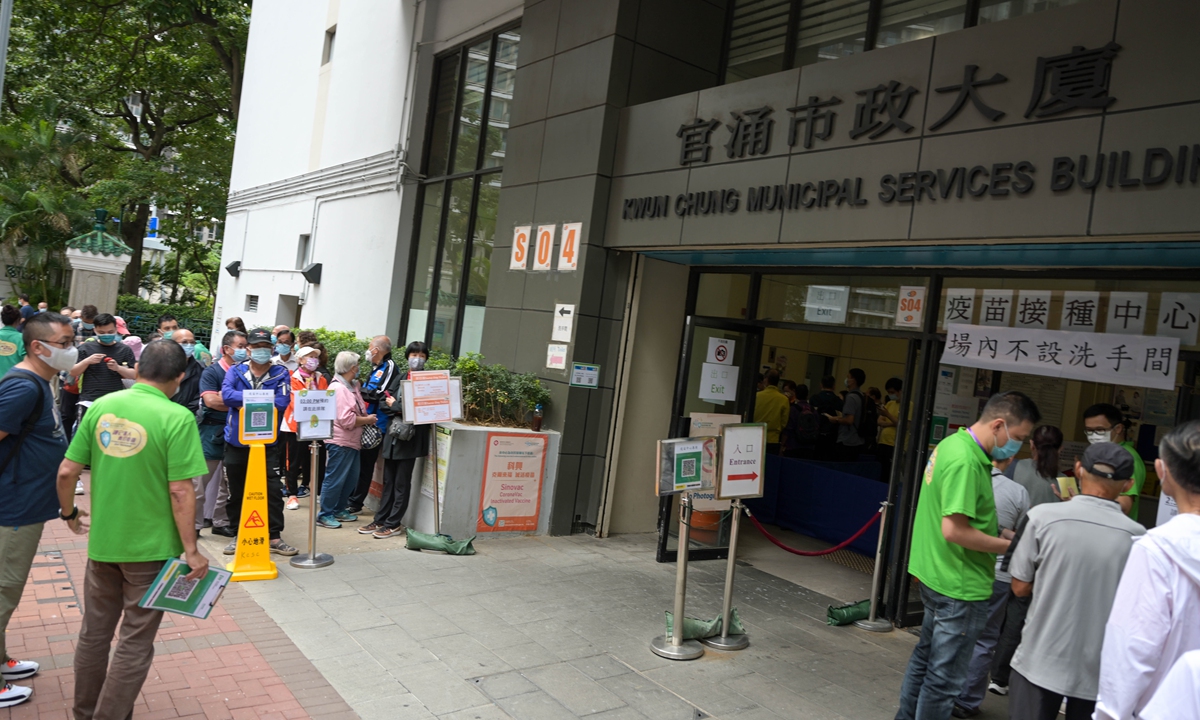
Hong Kong residents wait to accpet a third shot of COVID-19 vaccines on Novemver 11, 2021. Photo: VCG
The central government dispatched a delegation of epidemic prevention and control experts to the Hong Kong Special Administrative Region (HKSAR) on Saturday, which could be the final step toward the resumption of quarantine-free travel between the Chinese mainland and Hong Kong, observers said.
The resumption of quarantine-free travel between the mainland and Hong Kong is a highly anticipated policy that will benefit the people of both the mainland and Hong Kong, experts told the Global Times. However, before the implementation of this policy, Hong Kong still has to make efforts to further prevent imported cases and boost vaccination rates.
On Saturday, the delegation arrived in Hong Kong for a four-day visit to learn about the city's anti-epidemic efforts and measures, according to a press release from the HKSAR government. The experts will visit local institutions and facilities related to anti-epidemic work and meet relevant personnel to exchange views and share experiences.
On Sunday afternoon, the delegation inspected the Hong Kong International Airport, one of the most important parts of the city's epidemic prevention system.
Accompanied by officials from the city's Food and Health Bureau and Centre for Health Protection, the delegation was briefed upon arrival at the airport, and then visited the departure hall and the arrival hall to inspect the epidemic prevention efforts.
The delegation includes epidemic prevention and control experts from the National Health Commission, Shenzhen and Zhuhai in South China's Guangdong Province. The Hong Kong & Macao Affairs Office of the State Council and the Liaison Office of the Central People's Government in HKSAR are also represented.
The delegation's visit is an important follow-up to the meeting on anti-epidemic work of the mainland and Hong Kong on September 26 and the video conference exchange between them on November 2, according to the HKSAR government.
Experts told the Global Times that the delegation's visit could be the final step toward the resumption of quarantine-free travel between the mainland and Hong Kong, which is likely to take place as early as the beginning of December.
"As students from the Chinese mainland studying in Hong Kong, we really look forward to the resumption of quarantine-free travel, which will bring a high level of convenience," a student at Hong Kong Polytechnic University surnamed Ma told the Global Times on Sunday. "As far as I know, many Hong Kong residents have similar wishes."
"Hong Kong has matched all standards in terms of epidemic prevention to open up to the mainland," Jin Dongyan, a biomedical professor at the University of Hong Kong, told the Global Times on Sunday, noting that only few cases were confirmed in the past two months.
"The HKSAR government will continue to work toward the goal of zero infections and guard sternly against the importation of cases and the resurgence of local infections," said John Lee, chief secretary of the HKSAR government, on Saturday.
With Hong Kong's status as an important international hub, it could not and need not copy all of the anti-epidemic experience of the mainland, Jin noted.
However, Hong Kong still needs to make efforts to further prevent imported cases and boost vaccination rates before the resumption, experts noted.
"The resumption of quarantine-free travel is about mutual respect and trust in each other's system," Jin said. "It is also about setting up corresponding risk control mechanisms, including meltdown mechanisms that will be triggered by the report of a number of locally transmitted cases."
"Hong Kong still needs to demonstrate that it can control and track potential imported cases from abroad with its more lenient prevention mechanism than the mainland," Kennedy Wong Ying-ho, a Hong Kong-based member of the National Committee of the Chinese People's Political Consultative Conference, told the Global Times on Sunday.
"Hong Kong's vaccination rate [less than 70 percent] also needs to be further improved, which the HKSAR government could work on."
People have not been able to travel freely without quarantine between the mainland and Hong Kong since January 2020.
"It is great news that the central government dispatched the delegation," Tam Yiu-chung, a Hong Kong-based member of the Standing Committee of the National People's Congress, told the Global Times. "If the delegation makes recommendations and suggestions, I hope the HKSAR government will implement them as soon as possible.
The initial phase of quarantine-free travel may have a quota, and the HKSAR government should plan well in advance to avoid chaos after the start of the application process, so as not to discourage the public, said Tam.
Hong Kong has made intensive efforts to match up with the mainland's epidemic prevention requirements to boost the resumption of quarantine-free travel.
In September, Hong Kong announced a waiver of mandatory quarantine for travelers from low-risk areas of the mainland to the city.
Moreover, the Hong Kong airport manages the separation of people arriving from the mainland and international flights. The city has also introduced a health code mechanism similar to that of the mainland. In November, Hong Kong tightened its quarantine exemption arrangements, ceasing to allow travelers from many countries to enter the citywithout quarantine.
Hong Kong has advantages as a gateway to the mainland, and if the personnel of companies established in Hong Kong cannot travel to the mainland, it will "greatly diminish Hong Kong's status as an international business and financial hub," said Carrie Lam, chief executive of the HKSAR, on October 26.
"Although Hong Kong seems to be recovering economically, many of its industries are isolated from the mainland, which harbors great risks," Wong said. "The eventual restoration of quarantine-free travel is inevitable for Hong Kong and will help it better integrate into the country's development picture."




